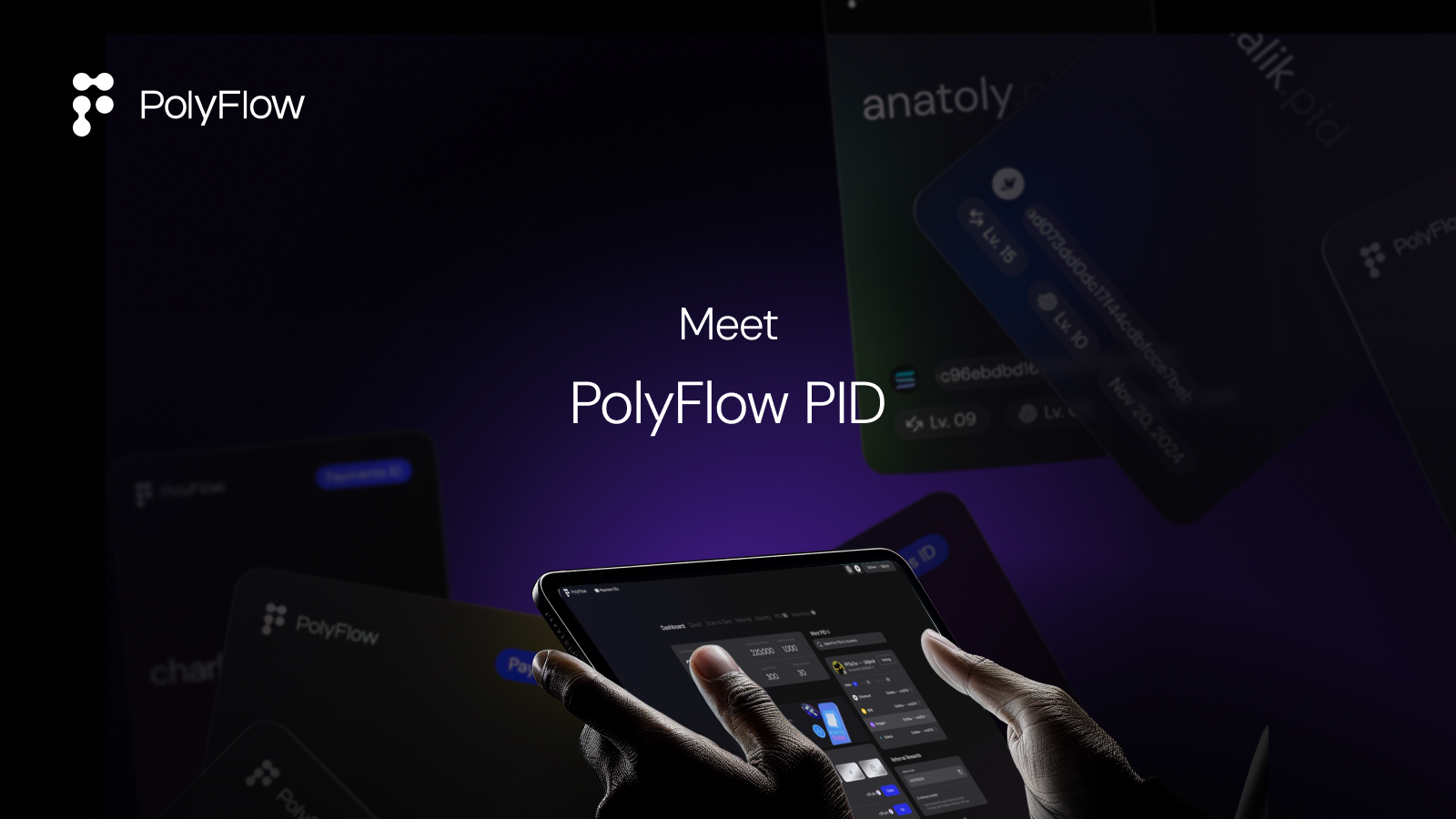PolyFlow PID — Redefine Your Crypto Wallet
The call for crypto mass adoption has echoed for years, yet blockchain remains an isolated realm, disconnected from everyday digital life. Even with Web3’s development of strong tools and infrastructure, the majority of users are still entrenched in Web2’s centralized platforms, which govern their data and form isolated data silos. Web3 has not yet delivered on its promise of user ownership, as it struggles to leverage existing real-world data effectively without compromising user privacy or in

The call for crypto mass adoption has echoed for years, yet blockchain remains an isolated realm, disconnected from everyday digital life. Even with Web3’s development of strong tools and infrastructure, the majority of users are still entrenched in Web2’s centralized platforms, which govern their data and form isolated data silos.
Web3 has not yet delivered on its promise of user ownership, as it struggles to leverage existing real-world data effectively without compromising user privacy or introducing new trusted intermediaries.
Until now, with the launch of PolyFlow’s PID incorporating Zero-Knowledge Proof (ZKP) and attestation services technologies, existing data from Web2’s centralized platforms can now be utilized on-chain while also acting as a bridge for Web3 applications to operate off-chain.
PolyFlow, as a Consumer PayFi infrastructure, seeks to seamlessly bridge the on-chain crypto realm with the off-chain real world using blockchain technology. Starting with seamless crypto payments, it extends into on-chain financial services and beyond. In this endeavor, PolyFlow PID serves as an essential component.
Why PID Matters?
Decentralized Identity (DID) represents a revolutionary approach where individuals generate a public-private key pair to create a DID Document, housed on decentralized networks like blockchain. This shift from centralized control to individual ownership embraces self-sovereignty. In PolyFlow’s PID system, users link credentials to their DID, stored as Verifiable Credentials (VCs), ensuring privacy during verification while maintaining asset ownership.
PID is a DID tailored for payments, connecting real-world identities with crypto wallets. It enables users to store, verify, and manage existing real-world data in the form of digital credentials, meeting compliance requirements while safeguarding privacy and promoting self-sovereignty.
As PolyFlow co-founder Raymond highlights,
“PID should function like a physical wallet, holding cash, IDs, credentials, and cards.” In this context, PID’s potential applications are extensive, offering a versatile tool for the evolving digital landscape.”
Redefine Crypto Wallets
In most crypto trading scenarios, crypto wallets are primarily used to hold trading assets. However, as stablecoins and crypto payments gain traction, these wallets fall short of meeting everyday needs. For instance, boarding a flight to Token2049 requires identification, and enjoying a night out at a bar requires proof of being over 18. These credentials are typically found in your physical wallet, not in your crypto wallets.
PID is redefining the capabilities of crypto wallets through Zero-Knowledge Proof (ZKP) and Attestation Service (AS) technologies. Beyond merely holding assets, these wallets can now store a variety of credentials to address users’ daily needs. This includes facilitating payments through on-chain attestation services integrated with PID, allowing them to perform functions akin to physical wallets.
With PID’s enhancements, these wallets offer the following core features:
- Verifiable Credentials(VCs) VCs are digital proofs of information issued by trusted sources. Individuals can hold these credentials and present them to verify claims without revealing unnecessary information. Key identity data, such as KYC verification, credit scores, and SIM attestations, can be written into the wallet as verifiable credentials, enabling “on-chain identity”.
- Privacy-Preserving Data Proofs By leveraging ZKP, users can demonstrate qualifications, such as being KYC-verified, creditworthy, or SIM-bound, without exposing underlying sensitive information, thus minimizing privacy risks.
- Cross-Scenario Payment and Access Control Beyond digital asset payments, a wallet can also carry permission-based credentials (e.g., to access specific app services, claim rewards, or verify device ownership), effectively bridging identity and payment in real-world applications.
- Enhanced Real-World Mapping As the VC ecosystem matures, crypto wallets will gradually replicate — and even surpass — the full functionality of physical wallets, becoming the primary digital identity gateway for Web3 users.
In essence, PID transforms crypto wallets from simple asset containers into trusted, privacy-preserving carriers of identity and access, capable of serving users’ everyday payment and verification needs with the same, or even greater, utility than a physical wallet. As we drive toward crypto mass adoption, these digital identities play a crucial role in our digital landscape.

Use Case —— eSIM Verification
Traditionally, activities such as opening an eSIM card or applying for a credit card require separate KYC processes for each platform. PID streamlines this by enabling cross-platform verification through VCs, thereby reducing redundancy and compliance costs.
At PolyFlow, we integrate the Solana Attestation Service (SAS) to enable our clients to anchor transaction proofs and participant credentials directly on-chain, ensuring every payment is traceable, verifiable, and tamper-proof.
By combining PID and SAS, PolyFlow powers ROAM — a DePIN open wireless network using OpenRoaming and eSIM — to issue and verify on-chain credentials for SIM cards. When a KYC-verified user requests a ROAM phone plan, the verifier securely validates the on-chain attestation to approve SIM issuance without requiring the user to undergo KYC again. This process ensures that each ROAM SIM is issued only to verified users, mitigating fraud risk and automating credential checks in a decentralized, privacy-preserving manner.
Beyond current ROAM eSIM card verification, the PID + SAS integration can support a wide range of future scenarios:
- DeFi Lending & Credit Scoring Record users’ on‑chain credit behaviors (repayment history, collateral performance, etc.) in PID attestations, enabling lending protocols to plug in trusted credit scores instantly.
- Supply Chain Finance Certificates Anchor proofs of authenticity for invoices, warehouse receipts, or bills of lading on‑chain via SAS, allowing financiers to disburse funds faster and reduce fraud risk in trade finance and factoring.
Additionally, with Zero-Knowledge Proof (ZKP) technology, PID ensures privacy protection, allowing verification without disclosing sensitive information, such as age confirmation without revealing full ID details. This maintains a balance between compliance and privacy, ensuring secure, efficient interactions.

Call to Action
For crypto to become mainstream, it needs to address users’ needs on the existing broad internet. PID lays the foundation for this by enabling encrypted trust from existing real-world data without third-party involvement, offering privacy-preserving user-controlled verification, and creating a composable identity layer.
PID not only redefines crypto wallets but also reshapes the boundaries between Web2 and Web3. This paves the way for new applications based on verifiable real-world interactions. As our online lives become increasingly accessible through verifiable claims, a new wave of applications will thrive, offering users greater control, reducing friction, and unlocking true value.
PID represents more than just another protocol; it embodies a new approach to how information moves between platforms and how trust is built in this new digital ear.
A series of PID-related tasks will soon be released on PolyFlow’s DAPP, inviting users to explore PID use cases with us. Stay tuned.
SOCIALS
To find out more about PolyFlow and keep up with our latest developments, follow the official channels.
🎮 DAPP | 💬 Global Community | 👾 Discord| 🐦 Twitter/X | 🌐 Website
CONTACT US
support@polyflow.tech